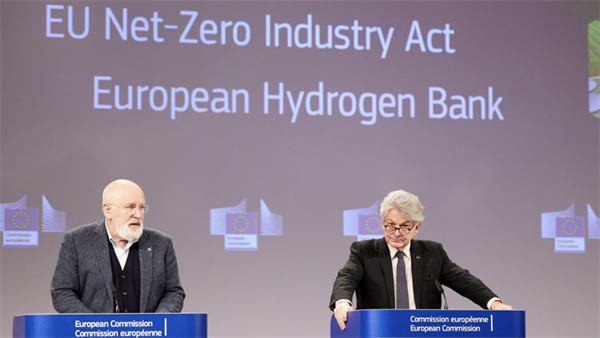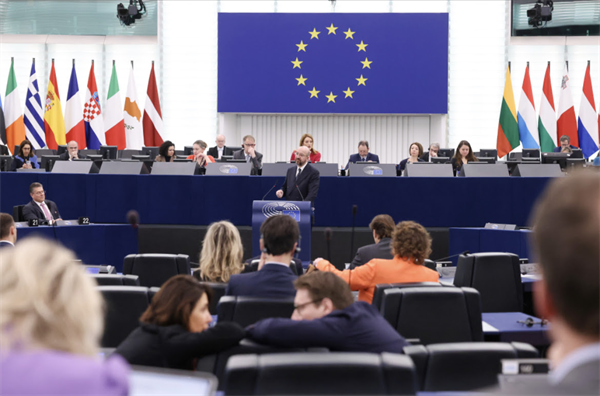The CCCEU Weekly Update 17 March 2023: Twin Acts

Twin Acts
Editor's Note: This edition of the CCCEU Weekly Update will keep you up to date on the latest China-EU dynamics. Enjoy your reading and have a nice weekend!
On Thursday, the European Commission released its long-awaited Net Zero Industry Act and the Critical Raw Materials Act, both key elements of the Green Deal Industrial Plan proposed by European Commission President von der Leyen in Davos in February. Overall, the "Net Zero Industry Act" focuses on improving the local manufacturing capacity of the EU's net-zero industry, while the "Critical Raw Materials Act" focuses on ensuring the supply security of critical raw materials upstream of strategic sectors such as the EU's net-zero industry, digital technology, the defence industry, and space technology.
The Net Zero Industry Act proposes that the manufacturing capacity in the EU of the strategic net-zero technologies approaches or reaches a benchmark of at least 40% of its annual deployment needs, including solar photovoltaic and solar thermal technologies, onshore wind and offshore renewable technologies, battery and storage technologies, heat pumps and geothermal energy technologies, electrolysers and fuel cells, sustainable biogas and biomethane technologies, carbon capture and storage, grid technologies.
To achieve the goal, the European Commission and member states will jointly establish a European Net Zero Platform to strengthen communication and coordination in the areas of simplification of the approval process, one-stop facilitation services, selection of net-zero strategic projects, financing support, market access, skills training, innovation incentives, etc. The Act requires member states to grant "the highest national significance" to net-zero strategic projects as much as possible, and accelerate the processing of approval and licencing, dispute resolution, and other aspects.
In terms of financing, the Platform can be supported by financial institutions such as the European Investment Bank and the European Bank for Reconstruction and Development, as well as fund projects from member states and the European Union. It is worth noting that in the chapter "access to markets" of the Act, more than 65% of the supply from a single source country for EU's specific net-zero industries is considered an important indicator affecting supply resilience. Suppliers from this import source country may be restricted from participating in public procurements as tenders in the EU market. Similar rules will also apply to any government procurement plan that subsidises consumer purchases.
The Critical Raw Materials Act proposes that by 2030, more than 10% of the annual consumption of strategic raw materials in the EU should be locally extracted, more than 40% should be locally processed, and more than 15% should be locally recycled. The proportion of annual consumption of each strategic raw material from a single import source country should not exceed 65%.
Although there are still many uncertainties and negotiating space between the introduction and legislative adoption, the two Acts reflect the EU's tendency to accelerate the localization process of the value chain.
In recent years, the EU has given priority to the autonomous control of industrial and supply chains, weakening the pursuit of production efficiency and guiding key industries to re-flow or transfer production links to like-minded partners through policies to reduce so-called external dependence. Although this protectionist approach by the EU helps to improve its emergency supply capacity, it undoubtedly destroys the existing global value chain structure oriented towards resource allocation optimization, weakens the industry's market based self-regulation function, reduces the synergy efficiency of the industrial chain, and has a negative impact on the overall benefits of international division of labour.
The two acts sought to replace low-cost net-zero products and their upstream raw material import trade by raising barriers to entry into the EU market. The resulting rise in the price of green products may ultimately be borne by consumers, and it risks hindering the green transformation of the EU.
China is an important producer of lithium batteries, wind power generation equipment, photovoltaic power generation equipment, and critical raw materials worldwide. In the field of net-zero industry, more than 90% of solar photovoltaic wafers and components, and more than 25% of electric vehicles and batteries in the EU are imported from China.
In the field of critical raw materials, 97% of magnesium and 100% of the rare earth used for magnets in the EU also come from China. If the two acts are finally implemented, they could impact the export of related products from China, but they may also attract Chinese enterprises with technological advantages in the net-zero industries and critical raw material extraction, processing, and recycling industries to invest directly in Europe.
However, considering the relatively small market size of public procurement projects that Chinese companies involve in the EU, especially after electricity price hikes, some projects may not be attractive compared to market-oriented projects. The threshold of market share may have a relatively limited impact on China's net-zero industry exports.
In addition, some have argued that there seem to be contradictions between the two Acts and WTO trade non-discriminatory rules, and there is still significant uncertainty in the final legislative version.
In comparison to the US Inflation Reduction Act, the EU's Net Zero Industry Act seems to lack the details of subsidies that could effectively attract inward investment in net zero industries. What is more, the EU's energy prices are higher than in the US, making it difficult to retain the pace of investment by related enterprises leaving for the US.
The European Central Bank Raises Rates Half a Point Amid Uncertainty
According to CNBC, the European Central Bank on Thursday announced a further rate hike of 50 basis points, signalling that it is ready to supply liquidity to banks if needed, amid recent turmoil in the banking sector.
EU institutions prepare to negotiate the European Digital Identity
The European Parliament adopted the mandate to enter inter-institutional negotiations for the European Digital Identity on Thursday, with the first political meeting planned for next week.
The European Digital Identity is designed to provide the legal framework for establishing a system of national digital wallets interoperable across the EU where citizens can access all documents, from birth certificates to driving licenses.
Michel: China and the US aren't equidistant

On March 15, European Council President Charles Michel addressed the European Parliament and said that "China and the US aren't equidistant from us."
However, the president added that China is a key actor on the international stage. "We have to engage to try to reduce dependency, which can be so expensive... I don't think anyone here is in any doubt that we have to engage with China on global issues. For instance, issues relating to climate change or health."
China asks EU to justify CBAM at WTO
According to SCMP, China has asked the European Union to justify its incoming carbon border tax at the World Trade Organization, a move that suggests it may challenge the law at Geneva's trade courts.
Beijing's WTO envoy on Wednesday proposed using the Committee on Trade and Environment for multilateral talks on "environmental measures that have given rise to controversies," starting with the EU's carbon border adjustment mechanism (CBAM), which China has insisted is not compliant with global trading rules.
Chinese President Xi Jinping to Pay a State Visit to Russia
On March 17, 2023, Chinese Foreign Ministry Spokesperson Hua Chunying announced that, at the invitation of President Vladimir Putin of the Russian Federation, President Xi Jinping will pay a state visit to Russia from March 20 to 22.
EPRS Policy Talks: What the EU is doing with China?
According to the European Parliament, it will host policy talks on China on March 23. The discussion will address crucial questions such as the development of EU-China relations over the past decade, the EU's perception of China today, the strength of the Russia-China relationship, and so forth.
What are experts talking about?
"The Impact and Response of the EU's Carbon Tariff", written by Wu Bixuan, points out that the Carbon Border Adjustment Mechanism (CBAM) has received a great deal of attention in China, focusing on its impact on Chinese exports and how to deal with it. The authors conclude that CBAM is the first unilateral trade measure focused on carbon emissions, but it will never be the last. While the impact of CBAM on Chinese exports may not be immediate, it sends a clear message that in the era of climate change, a new factor will affect trade and national competitiveness: carbon.
"Council recommendations on the Economic Policy of the Euro Area" looks at the 2023 recommendations on the economic policies of the euro area proposed by the Commission and agreed by the Council. The note provides a review of the euro area recommendations from an institutional perspective and includes broad comparisons to earlier recommendations, in order to illustrate how policy concerns have evolved over time.
Please note: the English version of this issue is slightly different from our Chinese one. The views and opinions expressed in this article do not necessarily reflect the official position of the CCCEU.

 Login
Login Login
Login CCCEU and Gunnercooke Successfully Host Webinar on CSDDD and FLR Compliance to Guide Chinese Businesses
CCCEU and Gunnercooke Successfully Host Webinar on CSDDD and FLR Compliance to Guide Chinese Businesses Cultivating responsible China-EU business leaders essential to tackling global challenges
Cultivating responsible China-EU business leaders essential to tackling global challenges



